
President Donald Trump is pursuing a markedly different foreign policy strategy than former President Joe Biden. He has withdrawn the United States from international agreements, is working more closely with Russia to end the war in Ukraine, has discussed taking over foreign territory and has imposed tariffs on trade partners.
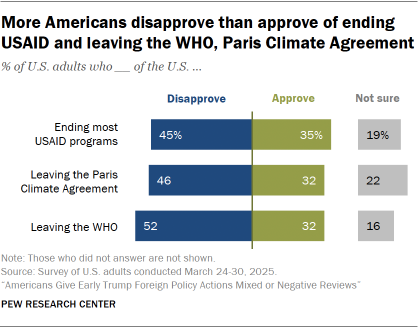
Many of these early foreign policy actions receive mixed or negative reviews from Americans, according to a survey of 3,605 adults conducted March 24-30, 2025.
For example, more Americans disapprove than approve of the U.S.:
- Leaving the World Health Organization
- Leaving the Paris Climate Agreement
- Ending most U.S. Agency for International Development (USAID) programs
Russia and Ukraine, Israelis and Palestinians
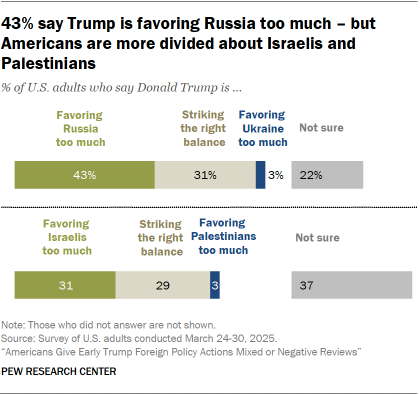
Many Americans also don’t see Trump’s handling of the Russia-Ukraine relationship as balanced: A 43% plurality says he is favoring Russia too much. Roughly three-in-ten say he’s striking about the right balance between Russia and Ukraine and 3% say he’s favoring Ukraine too much. Another 22% are unsure.
We also asked the public’s opinion on whether Trump is striking the right balance when it comes to U.S. relations with Israelis and Palestinians. Here, opinions are more mixed. Similar shares see him favoring the Israelis too much (31%) and striking the right balance (29%), with 37% unsure and 3% saying he’s favoring the Palestinians too much. (The survey was conducted prior to Netanyahu’s April visit to the U.S.)
Greenland and Gaza
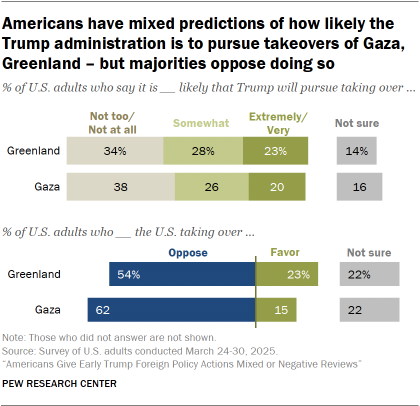
Americans are divided over how likely it is that Trump will pursue the U.S. taking over Greenland or Gaza. Around one-in-five Americans think Trump is extremely or very likely to pursue taking over Greenland or Gaza, with more saying these actions are not too or not at all likely.
Still, by more than a two-to-one margin, Americans oppose rather than favor the U.S. taking over these territories.
More Republicans support (41%) than oppose (28%) Trump’s proposal to take over Greenland, though around three-in-ten (31%) are unsure. But, in the case of taking over Gaza, more Republicans oppose (44%) than support (27%) the idea.
Tariffs on China
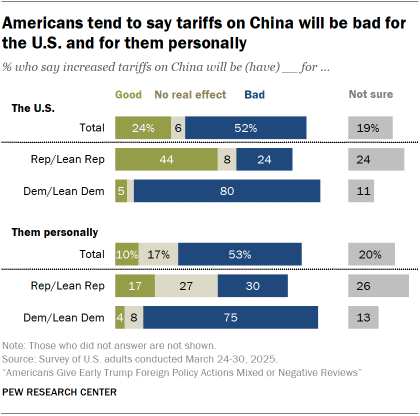
Tariffs are another key part of Trump’s foreign policy. Increased tariffs on China, specifically, receive more negative than positive evaluations. (The survey predated the detailed announcement of widespread global tariffs – including further tariffs on China – on April 2, as well as China’s retaliatory response. But Trump had already increased tariffs on China before the survey was fielded.)
Many more think the increased tariffs on China will be bad for the U.S. than say they will be good, though around a quarter either see them having no effect or are unsure.
Views of the tariffs’ personal impact are similarly negative: Americans are about five times as likely to say the increased tariffs on China will be bad for them as they are to say the tariffs will be beneficial.
Republicans are more likely than Democrats to say increased tariffs on China will be good for the U.S. and good for them personally. Still, when it comes to the personal impact of these tariffs, Republicans are more likely to say the impact will be bad (30%) than good (17%), even as substantial shares express uncertainty or anticipate the tariffs will have limited personal impact.
Jump ahead to read about views on:
- The U.S. withdrawing from the WHO and Paris Climate Agreement, ending most USAID programs
- How Trump is handling relations with Russia and Ukraine
- How Trump is handling relations with Israelis and Palestinians
- The U.S. pursuing a takeover of Greenland
- The U.S. pursuing a takeover of Gaza
- Increasing tariffs on China
The U.S. withdrawing from the WHO and Paris Climate Agreement, ending most USAID programs
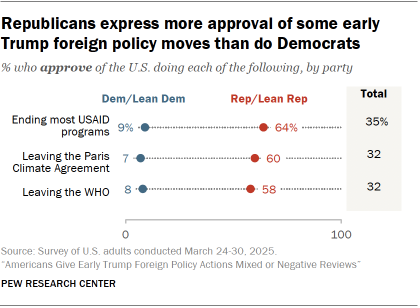
Within the first days of his second administration, Trump moved to withdraw the U.S. from both the World Health Organization (WHO) and the Paris Climate Agreement. The administration also took action to end most activities of the U.S. Agency for International Development (USAID).
Each of these policies are more unpopular than not, though the share saying they are unsure ranges from 16% to 22%.
Views by party
- 64% of Republicans and Republican-leaning independents support ending most USAID programs, compared with 9% of Democrats and Democratic leaners.
- 60% of Republicans support the U.S. leaving the Paris Climate Agreement; 7% of Democrats say the same.
- 58% of Republicans support the U.S. leaving the WHO, as do 8% of Democrats.
For each of these policies, Republicans are also more likely than Democrats to say they are unsure.
Views by age
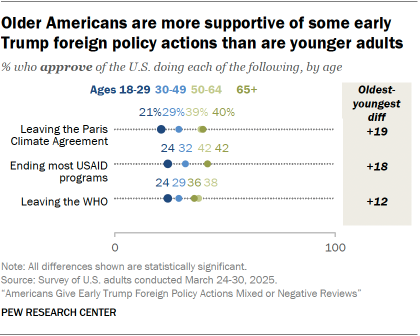
Generally, older adults are more likely to approve of Trump’s early foreign policy actions than younger adults.
For example, around four-in-ten Americans ages 50 and older approve of the U.S. leaving the Paris Climate Agreement, compared with 32% of those ages 30 to 49 and 24% of those under 30. (Younger adults are also more likely to say they are unsure.)
Older Republicans are particularly likely to approve of these policy actions, relative to younger ones, while age differences among Democrats are more muted.
How Trump is handling relations with Russia and Ukraine
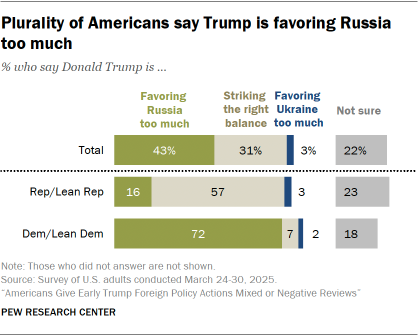
Since taking office, Trump has actively pursued a ceasefire between Russia and Ukraine. His approach, which differs sharply from Biden’s, has included phone calls with Putin, temporarily suspending military aid to Ukraine, and a tense Oval Office meeting with Ukraine President Volodymyr Zelenskyy.
A plurality of Americans see Trump favoring Russia too much (43%). Fewer say he’s striking about the right balance (31%), and only 3% say he’s favoring Ukraine too much. Roughly one-in-five are unsure.
Views by party
Republicans largely approve of Trump’s handling of the conflict: 57% say he’s striking the right balance, while 16% say he’s favoring Russia too much. Just 3% say that he’s favoring Ukraine too much, and about a quarter are unsure.
Around three-quarters of Democrats (72%) think Trump is favoring Russia too much, with few saying he’s striking the right balance (7%) or favoring Ukraine too much (2%). Around one-in-five are unsure.
How Trump is handling relations with Israelis and Palestinians
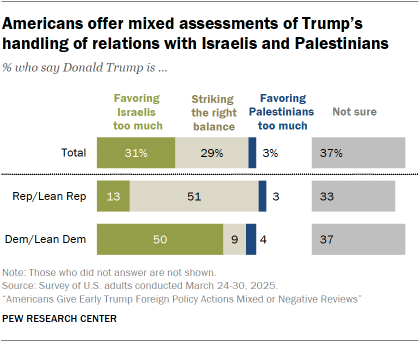
While few Americans think Trump is favoring the Palestinians too much (3%), they are otherwise fairly divided about whether he’s striking about the right balance between Israelis and Palestinians (29%) or favoring the Israelis too much (31%). More than a third (37%) are unsure.
For comparison, last July, Biden was about equally likely to be seen as favoring Israelis too much (21%) and favoring Palestinians too much (20%), with another 18% saying he was striking the right balance (and 40% unsure).
Views by party
At least a third in each partisan coalition are unsure about Trump’s handling of these Middle Eastern relationships. But whereas about half of Republicans think Trump is striking the right balance (51%), a similar share of Democrats (50%) think he’s favoring Israelis too much.
The U.S. pursuing a takeover of Greenland
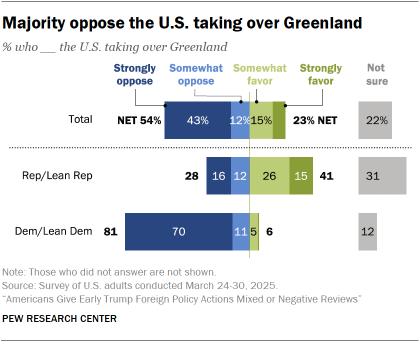
Trump has issued multiple calls for the U.S. to control Greenland. While the survey was in the field, Vice President JD Vance visited the island; Trump made additional statements about taking over Greenland after Vance’s visit.
Americans, however, are split over whether Trump will pursue trying to take over Greenland. Around a third (34%) say he is either not too or not at all likely to pursue the policy, with 28% saying it’s somewhat likely and 23% describing it as extremely or very likely (14% are unsure).
Americans don’t support the U.S. taking over Greenland: 54% oppose it, including 43% who strongly oppose it. Around a quarter (23%) favor the move, with another 22% saying they are unsure.
Views by party
Republicans and Democrats are equally likely to think Trump will pursue taking over the island territory. But Republicans are much more likely to favor the policy than Democrats (41% vs. 6%). Still, Republicans are somewhat internally divided, with 28% opposing and 31% unsure.
Among Democrats, opposition is widespread: 81% oppose the measure, including 70% who strongly oppose it.
The U.S. pursuing a takeover of Gaza
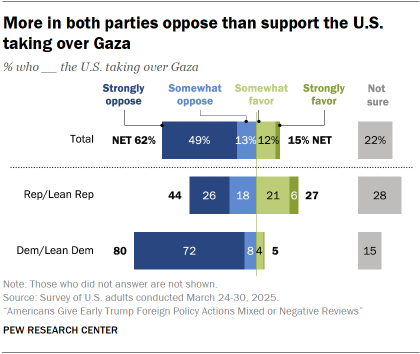
In February, during a joint news conference with Israeli Prime Minister Benjamin Netanyahu, Trump proposed the U.S. taking over the Gaza Strip, potentially resettling Palestinians elsewhere.
As is the case with the prospect of the U.S. taking over Greenland, a sizable share of Americans do not think it’s likely Trump will pursue this policy: 38% say it’s either not too or not at all likely, 26% say it’s somewhat likely, and 20% say it’s extremely or very likely. Another 16% are unsure.
Around six-in-ten Americans (62%) oppose the U.S. taking over Gaza, including 49% who strongly oppose it. Another 22% are unsure, while 15% favor it.
Views by party
Republicans are somewhat more likely than Democrats to say it’s unlikely Trump will try to take over Gaza (43% vs. 34%).
Republicans (27%) are also more likely than Democrats (5%) to favor this move, though pluralities in both parties oppose it. More than four-in-ten Republicans (44%) oppose the U.S. taking over Gaza, while another 28% are unsure. Democrats are fairly united in their opposition, with 80% saying they oppose the measure, including 72% who strongly oppose it.
Increasing tariffs on China
While various tariffs on other countries were threatened and sometimes delayed, Trump did increase tariffs against China in March, before the survey was fielded. (Since the survey concluded, he has announced additional tariffs on China and many other countries around the globe.)
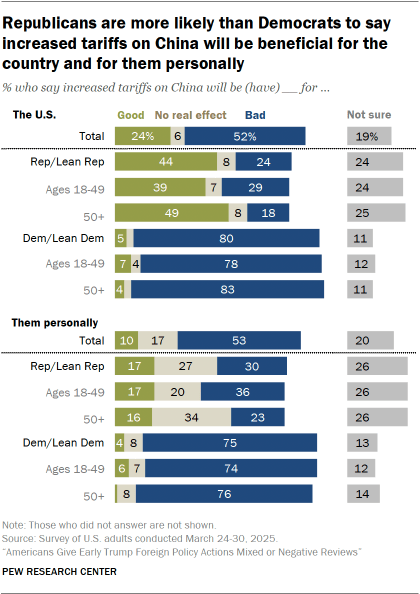
Around half of Americans (52%) anticipate this change will be bad for the U.S. and a nearly identical share (53%) say they will be bad for them personally.
Around a quarter of Americans (24%) think the increased tariffs on China will be good for the country. About half as many (10%) think they will be good for them personally.
Roughly one-in-five Americans are unsure about the potential impact of these tariffs, both on the country and their own lives. When it comes to their own lives, some say these tariffs will have no effect either way (17%). Fewer (6%) say the same about how they will impact the U.S.
Views by party
Republicans and GOP leaners are much more likely than Democrats and Democratic leaners to say that the increased tariffs on imported goods from China will be good for the U.S. (44% vs. 5%). They are also about twice as likely to say they are unsure (24% vs. 11%) and slightly more likely to say they will have no real effect either way (8% vs. 3%). Democrats, for their part, are fairly united in their view that the increased tariffs on China will be bad for the U.S.: 80% say this.
When it comes to the personal impact of tariffs, Republicans are also more likely than Democrats to say tariffs will be good (17% vs. 4%). But, on balance, Republicans are more likely to say increased tariffs on China will be bad for them personally than to say they will be good (30% vs. 17%). Still, about half of Republicans say they anticipate the tariffs will have no real effect either way on them personally (27%) or that they are unsure (26%).
A wide majority of Democrats think the tariffs will harm their own lives: 75% of Democrats say the tariffs will be bad for them personally. Another 13% are unsure, 8% anticipate no real effect either way, and 4% say they will be good.
Among Republicans, those under 50 are more likely than those ages 50 and older to say the tariffs will be bad for them personally (36% vs. 23%). Among Democrats, views on the tariffs’ personal effects do not differ significantly across age groups.




